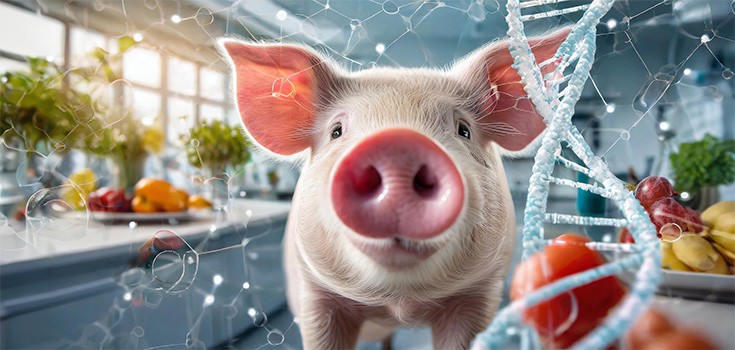Virus-Resistant GMO Pork Inches Closer to Human Consumption Amidst Consumer Uncertainty

Virus-resistant pork from genetically modified pigs could soon be served as your next meal. Are you ready for GMO bacon?
In a significant move, a UK-based company, Genus, is using CRISPR technology to create genetically modified pigs that are resistant to a virus known as porcine reproductive and respiratory syndrome (PRRS). The virus has inflicted financial havoc on global pork production to the tune of $2.7 billion annually.
This initiative, while promising to revolutionize the pork industry by potentially securing FDA approval as early as 2025, comes with it a myriad of ethical, environmental, and health-related questions.
The process involves modifying a specific gene, CD163, in pig embryos to render future generations immune to PRRS. This scientific achievement, described in the CRISPR Journal, could indeed mitigate the economic burden of the disease and reduce the suffering of countless animals.
If only CRISPR technology weren’t riddled with controversy, even leading to tons of unintentional genetic mutations.
The U.S. FDA Made Similar Moves Toward GMO Pigs
In late 2020, the U.S. Food and Drug Administration gave the green light to GMO ‘GalSafe’ pigs, marking them alongside salmon as the only genetically modified animals sanctioned for human consumption in the U.S.
These genetically engineered pigs, developed by Revivicor, were approved for use in both the culinary and medical sectors. They are designed to produce meat that is safe for individuals with meat allergies and can also be utilized in drug production and as a source of organs and tissues for human transplants.
The genetic modification in GalSafe pigs removes the alpha-gal sugar on their cell surfaces, which is responsible for allergic reactions in some people to red meats like beef, pork, and lamb. Initially, Revivicor plans to distribute GalSafe pork directly to consumers rather than through retail outlets.
From a medical standpoint, the FDA suggests that GalSafe pigs could be a valuable resource for creating medical products devoid of alpha-gal sugar, such as a specific form of the blood-thinning medication heparin.
Furthermore, tissues and organs from these pigs might help overcome the challenge of immune rejection in xenotransplantation, as alpha-gal sugar is a known factor in transplant rejection.
Not Everyone Approves of Genetically Modified Animals – Especially for Consumption
However, the prospect of gene-edited animals entering our food chain is not without its dilemmas.
The very fabric of our ecosystem could be altered in ways we cannot yet fully comprehend, raising poignant questions about the balance between technological advancement and the natural order.
The enthusiasm for such scientific progress is tempered by a cautious reflection on the long-term implications of altering the genetic makeup of living beings.
In the past, there have been various concerns voiced surrounding genetically modified salmon and other GMO foods. Genetically modified pigs is just the latest in a long line up of genetically modified creations.
Animal welfare organizations express apprehension that this technological leap could inadvertently entrench factory farming practices, leading to more inhumane conditions for livestock.
The concern is not just about the welfare of these gene-edited pigs but also about the broader ethical considerations of treating animals as mere commodities to be engineered for optimal productivity.
GMO Pigs for Organ Transplants
In another vein, Virginia biotech company Revivicor Inc. is utilizing genetically modified pigs to potentially solve the critical shortage of human organs for transplantation. By employing advanced genetic engineering techniques, the company has developed pigs with organs that might be compatible with human bodies, offering a beacon of hope for thousands of patients on transplant waiting lists.
The initiative promises several benefits, including alleviating the organ shortage crisis and reducing patient wait times for transplants.
The genetically modified pigs are engineered to ensure their organs are suitable for human transplantation, addressing issues like organ size, blood clot complications, and immune system rejection.
However, this innovative approach raises significant ethical and safety concerns. The morality of breeding animals specifically for organ harvesting and the potential risks of animal-to-human viral transmissions are central to the debate surrounding this technology.
As we stand on the brink of a new era in food production, the advent of gene-edited pork making its way to our dinner plates heralds a significant leap forward, yet it casts a shadow of concern over the unforeseen consequences of genetic engineering.
